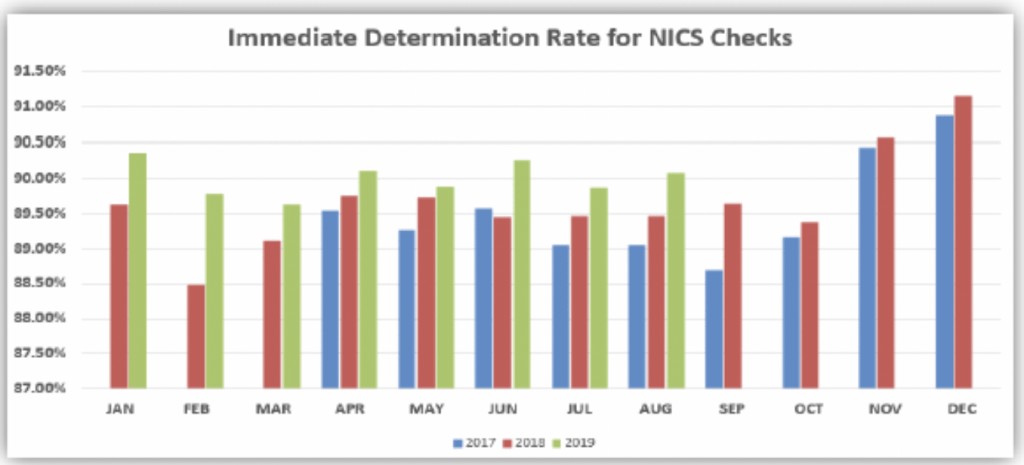Justice Department Rules Fix NICS Act A Success
In March 2018, President Trump signed into law the NSSF-championed Fix NICS Act. This bill, and versions sponsored by Sen. John Cornyn (R-Texas), and Reps. Henry Cuellar (D-Texas) and John Culberson (R-Texas) in their respective chambers, was aimed at ensuring relevant state and federal agency records are submitted to the NICS database. Sen. Coryn named his legislation after NSSF’s ongoing FixNICS® campaign, which has changed law in 16 states resulting in increase of more than 305 percent of disqualifying adjudicated mental health records submitted to the FBI.”
The U.S. Attorney General was charged by the Fix NICS Act to assess the plans and efforts of federal agencies, states and tribes to improve record submissions. The Attorney General is also required to publish a semiannual report on compliance with the Act. The first of these reports was recently released and, while it is early in the implementation process, the results are positive.
The Attorney General received “satisfactory” compliance plans from 45 Federal agencies, all 50 states, D.C. and Indian tribal governments. Another 44 Federal agencies have certified that they have no relevant records and do not expect to create any in the future.
Better Records, Better Screening
Between April 2018 and August 2019, there was a 6.2 percent increase (over six million records) in the number of records in the three databases searched with every NICS check: III, NCIC and the NICS Indices. The NICS Indices, the primary source for records related to mental health adjudication and illegal alien prohibitors, saw an increase of 15 percent in the number of records.
The increase in the number of records isn’t the only positive impact of the Act so far. According to the report, “The number of Firearm Retrieval Referrals (FRRs) (where a prohibited person is able to purchase a firearm because the background check could not be concluded within three business days due to incomplete records) decreased each month in comparison to the same month during the previous year, for an average monthly decline of 102 FRRs.”
Also, there was also an increase in the percentage of NICS checks receiving an immediate determination in most of the months analyzed. “With the exception of June 2018, there was an increase in the percentage of NICS checks resulting in an immediate determination compared to the previous year. Specifically, there was an average increase of 0.51 percent for each month when compared with the same month of the previous year.”

There is further evidence in the report that the Fix NICS Act is leading to improvements beyond an increase in the number of prohibiting records. A long-standing concern for NICS has been the number of arrest records in NICS without a corresponding disposition. These gaps are the source of delays as examiners must conduct research to determine whether an arrest resulted in a disqualifying conviction.
The report credits the Act with helping to close this gap: “The Act has provided the impetus for a number of agencies to review their arrest records and identify any missing dispositions. As a result, the total arrest to disposition completion percentage for all Federal agencies increased from 60 percent to 67 percent between March 31, 2018 and August 31, 2019.” Examples given for this improvement include a movement in the U.S. Immigrations and Customs Enforcement (ICE) to submit dispositions via an electronic method, rather than in a paper format.
States Stepping Up
Examples of states working to improve their record submissions include:
- North Carolina, which “established a NICS Working Group of internal and external subject matter experts to ensure the State is doing its part to provide the NICS with more complete information…Since March 2018, the SBI [North Carolina State Bureau of Identification] has updated 284,289 criminal convictions that previously had not been reported to the national database”;
- Ohio, which “established a NICS Working Group to assist in reporting all relevant records to the NICS. The NICS Working Group has been educating local courts regarding their reporting responsibilities to the NICS through development of quick reference guides for each court level within the State of Ohio”; and
- Wisconsin, which “implemented programmatic changes to require entry of misdemeanor warrants into the NCIC. This change resulted in a 297 percent increase of misdemeanor warrants in the NCIC from July 1, 2018, to January 1, 2019. Wisconsin also has been actively submitting missing dispositions over the last year, adding more than 3.3 million to the criminal history records. On June 30, 2018, Wisconsin had a disposition completion rate of 34 percent, and by June 30, 2019, that rate had increased dramatically to 82 percent.”
NSSF is encouraged by the strong compliance by Federal agencies and states so far and hopes to see further improvements in the databases as the Fix NICS Act is fully implemented.
